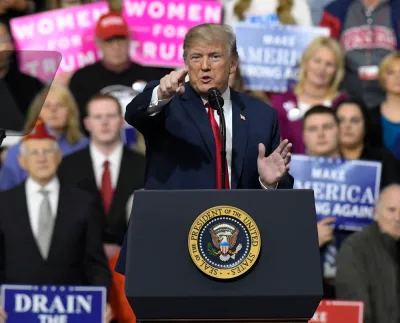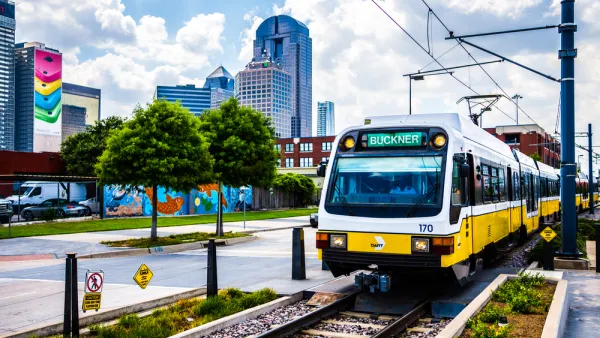It was touch and go there for a little bit today, but in the end President Trump signed a $1.3 trillion omnibus spending bill that spares many transit and community development programs.

President Trump signed a $1.3 trillion omnibus spending bill into law today, averting a government shutdown and resolving the ongoing mystery of how much funding for capital investment in transit and programs for the Department of Housing and Urban Development would survive the Republican party's control of Congress and the presidency.
Here's how Michael Grunwald describes the political drama that has flavored the Trump Administration's spending and legislative priorities in the first year-plus of its existence:
President Donald Trump’s budget proposals have taken a hatchet to President Barack Obama’s top priorities. They’ve called for deep cuts in renewable energy, medical research and nonmilitary spending in general. They’ve eliminated TIGER, a grant program for innovative transportation projects created by Obama’s stimulus bill; ARPA-E, an energy research agency launched by the stimulus; and CDBG, a community development program many Republicans consider an urban slush fund.
What then was the actual result of all those pronouncements by the Trump Administration? "Now the Republicans who control Congress have passed a $1.3 trillion omnibus spending bill, and it not only protects Obama’s priorities, it expands them," writes Grunwald.
President Trump's displeasure with the substance of the omnibus spending bill could be detected throughout the day leading up to his signing the bill. He spent the morning threatening to veto the bill and said he would "never sign another like this," but sign the bill, he did.
For more details on the substance of the omnibus spending bill, see articles posted earlier this week by Dylan Matthews for Vox and another by a trio of reporters for the Washington Post. CBS and the AP published an article about the details of the bill earlier this week. Planetizen Correspondent Irvin Dawid also reported on the consequences of the bill for the beleaguered Amtrak Gateway Program.
Here are a few key takeaways with regard to federal programs that fund planning efforts around the country:
- The budget for the TIGER transportation grant program will triple. (As noted by Angie Schmitt earlier this month, however, the TIGER grant funding under the Trump Administration might not resemble the transit-friendly program of the Obama Administration).
- The budget for the Community Developement Block Grant will almost double, from $2.8 billion to $5.2 billion.
- The Census Bureau receives $1.34 billion increase in funding over last year's allocation in the bill (the 2020 Census will still be a subject of concern).
- Trump wanted to slash the Energy Department’s renewables budget 65 percent; instead, Congress boosted it 14 percent.
- $1.6 billion for border security—but with limitations on how the money can be spent (i.e., it can't be spent on the president's pet border wall project).
FULL STORY: Congress releases $1.3 trillion spending bill — here's what's in it

Analysis: Cybertruck Fatality Rate Far Exceeds That of Ford Pinto
The Tesla Cybertruck was recalled seven times last year.

National Parks Layoffs Will Cause Communities to Lose Billions
Thousands of essential park workers were laid off this week, just before the busy spring break season.

Retro-silient?: America’s First “Eco-burb,” The Woodlands Turns 50
A master-planned community north of Houston offers lessons on green infrastructure and resilient design, but falls short of its founder’s lofty affordability and walkability goals.

Test News Post 1
This is a summary

Analysis: Cybertruck Fatality Rate Far Exceeds That of Ford Pinto
The Tesla Cybertruck was recalled seven times last year.

Test News Headline 46
Test for the image on the front page.
Urban Design for Planners 1: Software Tools
This six-course series explores essential urban design concepts using open source software and equips planners with the tools they need to participate fully in the urban design process.
Planning for Universal Design
Learn the tools for implementing Universal Design in planning regulations.
EMC Planning Group, Inc.
Planetizen
Planetizen
Mpact (formerly Rail~Volution)
Great Falls Development Authority, Inc.
HUDs Office of Policy Development and Research
NYU Wagner Graduate School of Public Service




























